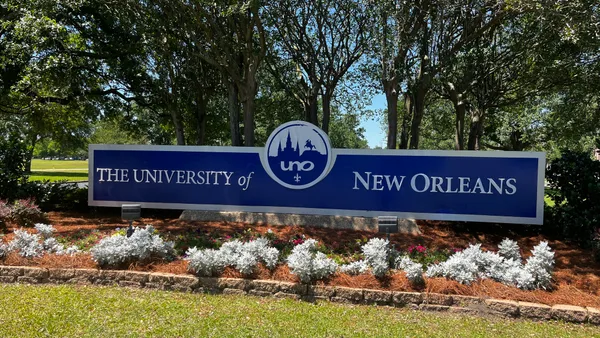Dive Brief:
- Four in five high school seniors have completed the Free Application for Federal Student Aid, according to a new survey by consultancy EAB. It polled 15,291 students, 40% of whom were seniors.
- However, the share of low-income students who planned to file a FAFSA but had not yet done so was double that of higher-income students who said the same.
- The findings follow earlier data suggesting enrollment this coming fall could lag for low-income and first-generation students, along with those from underrepresented minority groups.
Dive Insight:
Applying for financial aid is considered to be a strong indicator that a student will enroll in college. Additionally, higher ed experts worry the pandemic's outsized impact on low-income and Black and Latino communities, in particular, could impact college-going among those students.
Of EAB's sample, 20% of students were first-generation, 23% were Hispanic/Latinx and 14% were Black. Around 22% said their families made $60,000 or less a year, though 42% of respondents were unsure how much their families earned.
Its findings aren't the only sign enrollment could lag this fall among students from these groups.
FAFSA completions were down 7.6% year over year as of March 26, according to the National College Attainment Network. However, they lagged more among students from low-income high schools (-10.5%) and students from high schools with large shares of Black and Hispanic students (-12.4%).
Data from the Common App is more hopeful. It shows low-income students, counted as those receiving a fee waiver, have closed and first-generation students have narrowed an earlier gap in the number of unique application filings as of March 1. Around 900 colleges accept the Common App. Fee waiver students are now ahead of the year-ago mark by 1%.
EAB found that larger shares of low-income and first-generation students (37% and 40%, respectively) filled out the FAFSA themselves this year compared to higher-income students (11%). And more than 30% of students in the former two groups said the FAFSA was difficult to complete, while around half that share said the same among higher-income students.
The organization advises colleges to communicate clearly and proactively with students about their financial aid options, particularly those whose families lost income during the pandemic and those who are unauthorized immigrants or whose parents are. Extending priority deadlines and offering in-person filing sessions can also help, it notes.















